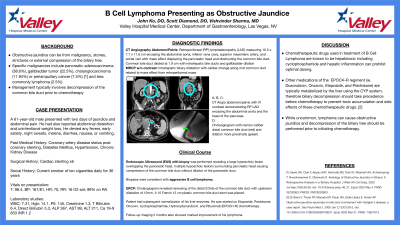Tuesday Poster Session
Category: Biliary/Pancreas
P2923 - B Cell Lymphoma Presenting as Obstructive Jaundice
Tuesday, October 24, 2023
10:30 AM - 4:00 PM PT
Location: Exhibit Hall

Has Audio

John Ko, DO
Valley Hospital Medical Center
Las Vegas, NV
Presenting Author(s)
John Ko, DO, Scott Diamond, DO, Vishvinder Sharma, MD
Valley Hospital Medical Center, Las Vegas, NV
Introduction: Obstructive jaundice can be caused by malignancy, stones, strictures, or external compression of the biliary tree. Malignancies known to cause obstructive jaundice are pancreatic adenocarcinoma, gallbladder tumor, cholangiocarcinoma, periampullary cancer, or less commonly lymphoma. We present a case of B-Cell Lymphoma presenting as obstructive jaundice.
Case Description/Methods:
61-year-old male with coronary artery disease, diabetes mellitus, hypertension, and chronic kidney disease presented with two days of jaundice, abdominal pain and distension, reduced appetite, and unintentional weight loss. He denied history of IV drug or alcohol use. Initial labs showed total bilirubin 6.4, conjugated bilirubin 5.3, alkaline phosphatase 367, AST 99, ALT 211, and Ca 19-9 833.
CT abdomen pelvis with IV contrast demonstrated a focal area of retroperitoneal lymphadenopathy 10.5 x 7.7 x 11.6 cm encasing the abdominal aorta, inferior vena cava, superior mesenteric artery, portal vein with a mass effect displacing the pancreatic head and obstructing the common bile duct. MRCP showed intrahepatic biliary dilatation with extrinsic compression from lymphadenopathy. The dilated common bile duct (CBD) measured 15mm. Also noted were subtle signal abnormalities seen in the liver. No filling defects or strictures were visualized.
An Endoscopic Ultrasound with biopsy revealed a large hypoechoic lesion overlapping the pancreatic head with enlarged lymph nodes. Multiple biopsies were taken of the lesion consistent with aggressive B cell lymphoma.
An ERCP was then performed. Cholangiography revealed narrowing of the distal two-thirds of the CBD with upstream dilatation of 12 mm. A plastic stent was placed in the CBD with subsequent normalization of the LFTs.
Chemotherapy was initiated with Etoposide, Prednisone, Oncovin, Cyclophosphamide, hydroxydanurubicin, and Rituximab (EPOCH-R). Follow up CT Abdomen Pelvis without contrast five months after initiation of chemotherapy showed marked improvement.
Discussion: Certain chemotherapeutic drugs can be hepatotoxic such as cyclophosphamide and other medications of the EPOCH-R regimen are metabolized by the liver. Biliary decompression should take precedence before chemotherapy to prevent toxic accumulation of these medications. Patients that had biliary drainage via stent placement resolved their obstruction without return of hyperbilirubinemia. Uncommonly, lymphoma can cause obstructive jaundice and decompression of the biliary tree should be performed prior to chemotherapy.

Disclosures:
John Ko, DO, Scott Diamond, DO, Vishvinder Sharma, MD. P2923 - B Cell Lymphoma Presenting as Obstructive Jaundice, ACG 2023 Annual Scientific Meeting Abstracts. Vancouver, BC, Canada: American College of Gastroenterology.
Valley Hospital Medical Center, Las Vegas, NV
Introduction: Obstructive jaundice can be caused by malignancy, stones, strictures, or external compression of the biliary tree. Malignancies known to cause obstructive jaundice are pancreatic adenocarcinoma, gallbladder tumor, cholangiocarcinoma, periampullary cancer, or less commonly lymphoma. We present a case of B-Cell Lymphoma presenting as obstructive jaundice.
Case Description/Methods:
61-year-old male with coronary artery disease, diabetes mellitus, hypertension, and chronic kidney disease presented with two days of jaundice, abdominal pain and distension, reduced appetite, and unintentional weight loss. He denied history of IV drug or alcohol use. Initial labs showed total bilirubin 6.4, conjugated bilirubin 5.3, alkaline phosphatase 367, AST 99, ALT 211, and Ca 19-9 833.
CT abdomen pelvis with IV contrast demonstrated a focal area of retroperitoneal lymphadenopathy 10.5 x 7.7 x 11.6 cm encasing the abdominal aorta, inferior vena cava, superior mesenteric artery, portal vein with a mass effect displacing the pancreatic head and obstructing the common bile duct. MRCP showed intrahepatic biliary dilatation with extrinsic compression from lymphadenopathy. The dilated common bile duct (CBD) measured 15mm. Also noted were subtle signal abnormalities seen in the liver. No filling defects or strictures were visualized.
An Endoscopic Ultrasound with biopsy revealed a large hypoechoic lesion overlapping the pancreatic head with enlarged lymph nodes. Multiple biopsies were taken of the lesion consistent with aggressive B cell lymphoma.
An ERCP was then performed. Cholangiography revealed narrowing of the distal two-thirds of the CBD with upstream dilatation of 12 mm. A plastic stent was placed in the CBD with subsequent normalization of the LFTs.
Chemotherapy was initiated with Etoposide, Prednisone, Oncovin, Cyclophosphamide, hydroxydanurubicin, and Rituximab (EPOCH-R). Follow up CT Abdomen Pelvis without contrast five months after initiation of chemotherapy showed marked improvement.
Discussion: Certain chemotherapeutic drugs can be hepatotoxic such as cyclophosphamide and other medications of the EPOCH-R regimen are metabolized by the liver. Biliary decompression should take precedence before chemotherapy to prevent toxic accumulation of these medications. Patients that had biliary drainage via stent placement resolved their obstruction without return of hyperbilirubinemia. Uncommonly, lymphoma can cause obstructive jaundice and decompression of the biliary tree should be performed prior to chemotherapy.

Figure: Retroperitoneal Adenopathy on CT abd/pelvis w/ contrast
Disclosures:
John Ko indicated no relevant financial relationships.
Scott Diamond indicated no relevant financial relationships.
Vishvinder Sharma indicated no relevant financial relationships.
John Ko, DO, Scott Diamond, DO, Vishvinder Sharma, MD. P2923 - B Cell Lymphoma Presenting as Obstructive Jaundice, ACG 2023 Annual Scientific Meeting Abstracts. Vancouver, BC, Canada: American College of Gastroenterology.
